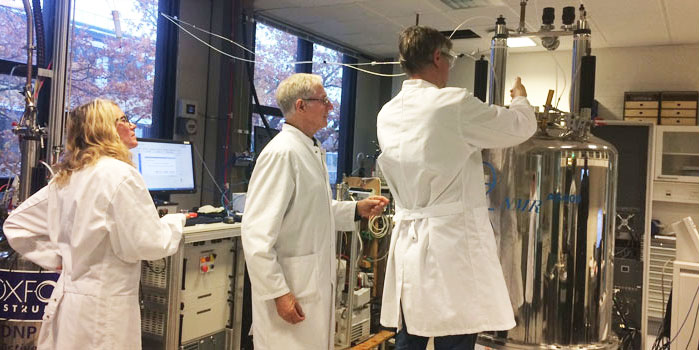Professor Philip Kuchel is visiting Center for Hyperpolarization in Magnetic Resonance (HYPERMAG) for an extended period, to participate in a series of joint experiments using Hyperpolarized 133Cesium and energy substrates to study the mechanosensation and shape regulation of living cells.
Philip Kuchel is Emeritus Professor in Physical Biochemistry at University of Sydney, Australia. He is a renowned scientist in the field of NMR spectroscopic studies of metabolic and membrane transport processes in cells to understand cellular function at the molecular level and its relevance to disease; most notably human erythrocytes, red blood cells.
In 2017, Kuchel et al. published a remarkable study in Science Advances, for the first time experimentally demonstrating how metabolism and cation transport are accelerated by mammalian cell distortion. The study showed the linkage between imposed mechanical distortion in whole mammalian cells to changes in their energy consumption; a doubled glycolytic flux was measured in the metabolism of the affected erythrocytes. When seeking a mechanism for the linkage between shape and energy supply, they measured a five-fold increase in transmembrane cation flux using 133Cesium NMR spectroscopy.
Also in 2017, HYPERMAG researchers published a study demonstrating how it is possible to obtain more than 10,000 fold signal enhancement in 133Cesium NMR spectra through the hyperpolarization technique Rapid Dissolution Dynamic Nuclear Polarization. This enormous short-lived signal enhancement was shown to allow real-time monitoring of physical changes in living cells.
Now, joining forces, Professor Kuchel and HYPERMAG scientists Mathilde H. Lerche, Magnus Karlsson and Jan Henrik Ardenkjaer-Larsen will merge their respective experiments in order to study the uptake of hyperpolarized 133Cesium in erythrocytes that have altered function, to quantitatively and non-invasively measure factors that regulate shape and volume in erythrocytes, and by analogy all cells.
It is the hope that their experiments will lead to a demonstration that hyperpolarized 133Cesium NMR is a valuable NMR tracer for sensitive and rapid, non-invasive analysis of biological systems that can shed further light on how living cells physically sense and respond to the surrounding environment on a molecular level. A successful outcome may inspire e.g. drug discovery affecting the pathways connecting cell shape and metabolism, allowing the manipulation of the biochemical state of the body.
Professor Kuchel will work with HYPERMAG throughout November 2018 to initiate the project, planning to return in April 2019 for a three month stay to conduct a more in-depth sequence of experiments together with our researchers. For more information on his activities at University of Sydney, please visit https://sydney.edu.au/science/people/philip.kuchel.php.
Professor Kuchel’s research activities at HYPERMAG are generously funded by Lundbeck Foundation through a Visiting Professor grant (R290-2018-538).
Top photo: From left to right, Senior Researcher Magnus Karlsson, Visiting Professor Philip Kuchel, and Senior Researcher Mathilde H. Lerche.
Schematic representation of the linkage between mechanical distortion of a red blood cell and stimulation of its metabolism. Kuchel et al., Accelerating metabolism and transmembrane cation flux by distorting red blood cells, Science Advances 18 Oct 2017, Vol. 3, no. 10, DOI: 10.1126/sciadv.aao1016.

Experiments in the HYPERMAG labs at DTU.
Center for Hyperpolarization in Magnetic Resonance was founded in 2015 on a grant from Danish National Research Foundation.
Hyperpolarization is a technique to achieve a dramatic enhancement of the Magnetic Resonance signal.
The HYPERMAG Center is committed to further hyperpolarization by addressing basic scientific questions that provide a theoretical and experimental basis of the magnetic resonance signal and optimal ways of extracting information about the system to enable new, significant applications in medicine, biology and chemistry.
Visit http://www.hypermag.dtu.dk/ for more information.